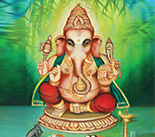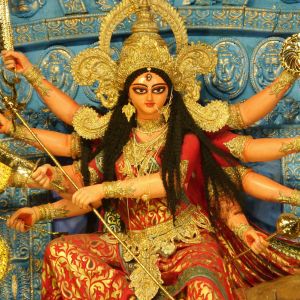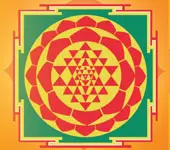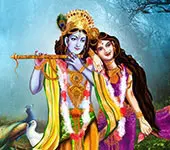This audio tells you about - 1. The seekers journey through dharma, Martha, kama and moksha 2. How good money purifies you 3. How bad money mars your spiritual progress.
How to avoid worldly desires?
According to Narada-bhakti-sutra. 7-8, you can get rid of worldly desires by avoiding worldly activities and also by developing desire for Bhagavan.
Does a bhakta have to give up worldly and scriptural duties?
Not necessarily; he would rather change every kind of duty as service to Bhagavan. For him, every task is an opportunity to serve Bhagavan.
How to attain oneness with God?
You must surrender your body, mind, and ego completely to God in order to achieve oneness with him. In the state of oneness, the devotee realizes that God alone is acting through him.
How to develop single-minded devotion?
In order to develop single-minded devotion, the mind must be trained. It is natural for the mind to wander towards gossip, politics, sensational issues, worldly comforts, etc. When your mind wanders, draw it back to the lotus feet or the image of Bhagavan. Eventually, this tendency diminishes. Positive qualities such as faith, patience, tolerance, fasting, satwik diet, and brahmacharya can help develop a single-minded focus on Bhagavan.
What happens when your source of money is pure?
As you go on utilizing it, it purifies you and makes you less and less attached to the world.
What happens when your source of money is not pure?
Utilizing money that is impure makes you more and more attached to the world. You become more and more addicted to pleasures and enjoyments.
Quiz
Who is the author of Kama Sutra?Transcript
(Click here to read more)
Rishis asked Suta, the narrator of Srimad Bhagavata, what is the essence of all shastras? Suta said, bhakti. Jnana and vairagya are subservient to bhakti. Wherever bhakti is there, jnana and vairagya come on their own. As much as they are required, not more, not less. So if bhakti is the ultimate path to be followed, then isn’t there a contradiction here because the purusharthas – the four purusharthas – the four purposes of life – the four goals of life – dharma , artha , kama and moksha - if here dha....
Transcript
(Click here)
Rishis asked Suta, the narrator of Srimad Bhagavata, what is the essence of all shastras?
Suta said, bhakti.
Jnana and vairagya are subservient to bhakti.
Wherever bhakti is there, jnana and vairagya come on their own.
As much as they are required, not more, not less.
So if bhakti is the ultimate path to be followed, then isn’t there a contradiction here because the purusharthas – the four purusharthas – the four purposes of life – the four goals of life – dharma , artha , kama and moksha -
if here dharma is equal to bhakti, having bhakti, observance of bhakti,
in that case, should lead to artha, wealth, which should lead to kama, achievement of desires, and finally to moksha.
But if you see, most of the bhaktas are not so rich.
Some of them are poor.
Many of them wander about in the streets and survive on bhiksha.
Why is this so?
If bhakti is the parama dharma, then why is it not leading to wealth and thereafter comforts obtained through wealth?
The first point; for the bhaktas, they are not even bothered whether they are rich or poor.
They are above all these.
Anyway, for those looking at the bhaktas from outside, here is the explanation.
Artha should come out of dharma.
Artha should never flout the principles of dharma.
That means artha or wealth should not come out of dishonesty or harming others or such things.
Such wealth can be utilized for the attainment of desires.
What can be these desires, that we will see later.
There are three groups of desires as per shastra.
That we will see later.
Desires are permitted.
Within limits, desires are permitted.
Otherwise, artha and kama would not have been there as purushartha.
Only dharma and moksha.
It is not like that.
Artha and kama have been given a due place among the goals of life, the purpose of life.
Wealth earned through dharma, dharmic means when that wealth is utilized towards the attainment of desires, then slowly slowly that will help you to develop non-attachment.
The wealth generated through unfair means, when that is utilized to attain desires, will make you more and more attached, to crave for more.
It will make you sink more and more into the ocean that is samsara.
It will make you addicted to enjoyments.
You will get bored, frustrated, angry if the supply of enjoyment or entertainment is cut.
You will not know how to live without them.
You will feel what am I living for?
You will be lost.
You equate life with enjoyment.
This is what happens when you earn wealth through unfair means and adharmic means.
Another point to be understood here.
Artha and kama are not mandatory.
Confine yourself to dharma.
If wealth comes out of it, utilize it for the attainment of desire.
The starting point is dharma.
Not that I have wealth, let me observe dharma.
Dharma is the starting point.
Dharma, observance of dharma is the primary point.
Then, let wealth come or not come.
If wealth comes, then naturally that wealth would only lead you towards desires, which again will be of dharmic nature.
Also, use your discretion to make sure that you are not misled.
So the question of wealth comes only if it is generated.
For someone who practices dharma in the conventional way, let’s say the four classes - the teaching class, the warrior class, the trader class, and the employee class.
For them there is a livelihood, they earn, there is wealth coming as a result of their manual effort.
What to do with it, they have to think about.
But in bhakti marga, what is your primary occupation?
Singing the Lord’s glories, taking his names, doing his worship; how are you going to earn wealth through all these?
In today’s world?
Yes, possible.
Doing all these also you can earn wealth.
But that is not bhakti, that is again livelihood.
In pure bhakti, there is no generation of wealth.
The bhakta is not bothered.
It is the botheration of the Lord to take care of his needs, requirements.
Is an infant really bothered about what it gets to eat, what it wears?
The mother is concerned.
Not the child.
It is the mother’s responsibility.
When the child is hungry, it cries.
Not knowingly, it is a reaction of the body.
The child may not even realize that it is crying.
Why a child?
Even at the age of 8 or 10 or 12, it is the mother who makes sure that the child eats properly at the right time, takes bath, studies.
For the bhakta, it is the lord’s responsibility.
The bhakta has already surrendered himself or herself.
I don’t know anything.
If you want to take care of my body, do it.
If I should eat, feed me whenever you want.
I will take it as your blessing.
If you think starving is more beneficial for me, do it.
I have no problem.
Nowadays, even Nobel laureates are saying starving is good for health.
When you are starving me, you are warding off diseases from my body.
It can’t be otherwise.
I am not really bothered.
This is the attitude of the bhakta.
The outsider, the observer, should understand this.
Then only this confusion will go from the mind.
That is why the Lord is not giving a lot of wealth to the bhakta.
Recommended for you
Lord Ganesha Blesses Kardama

This is a story about the greatness of Ganesha Chaturthi Vrata. It is from Ganesha Purana.....
Click here to know more..Why Is Devi Called Hunger?

Do you know why Devi is addressed as Kshudha meaning hunger? Learn here....
Click here to know more..Lalitha Ashtottara Shatanamavali

om shivapriyaayai namah' . om shivaaraadhyaayai namah' . om shivesht'aayai namah' . om shivakomalaayai namah' .....
Click here to know more..
English Topics
Bhagavatam
Click on any topic to open
- 65 Bhagavan's External Deeds
- 64 Is the Body Yours?
- 63 What's So Great About The Stories Of Sri Krishna
- 62 What To Do If You Just Don't Have Interest In Bhagawan
- 61 Which God Should I Worship?
- 60 How To Observe Dharma Properly
- 59 Devotee's progress
- 58 Which Guruji Can You Trust
- 57 Bhagawan Is Beyond Human Comprehension
- 56 The Missing Piece: Why Your Spiritual Practices Are Not Working
Please wait while the audio list loads..
30
Ganapathy
Shiva
Hanuman
Devi
Vishnu Sahasranama
Mahabharatam
Practical Wisdom
Yoga Vasishta
Vedas
Rituals
Rare Topics
Devi Mahatmyam
Glory of Venkatesha
Shani Mahatmya
Story of Sri Yantra
Rudram Explained
Atharva Sheersha
Sri Suktam
Kathopanishad
Ramayana
Mystique
Mantra Shastra
Bharat Matha
Bhagavatam
Astrology
Temples
Spiritual books
Purana Stories
Festivals
Sages and Saints
